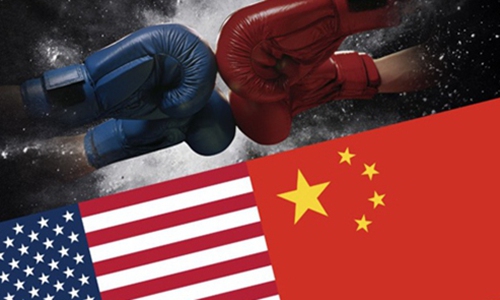Trump’s move on Hong Kong stems from US domestic political pressure
Source:Global Times Published: 2020/6/1 22:58:40

Photo: GT
The US death toll from the novel coronavirus hit over 100,000 on Wednesday. Two days later, protests erupted in Minneapolis over the death of an African American man in police custody.
However, at a press conference on Friday, US President Donald Trump expressed his concern on neither of them. Instead, he continued to divert attention onto China, blasting it for passing national security legislation for its Hong Kong Special Administrative Region. He threatened to revoke the Chinese city's special trading status in an attempt to contain Beijing.
Seeking four more years is Trump's main political consideration at this point. Trump has been concerned with Hong Kong affair as it is one of the cards he can use to find fault with China.
Adopting a hard-line stance toward Beijing has been a kind of political correctness for Washington. Meanwhile, the Trump administration is under mounting domestic pressure to be tough against China. Therefore, it could impose some practical measures.
However if, as what Trump said at the news conference, the US revokes Hong Kong's special status, it will irreversibly damage the business interests of a slew of US companies investing in Hong Kong. To secure their support in the election, the Trump administration may not rashly take substantive moves in this regard.
Trump also announced terminating the US' decades-long relationship with the World Health Organization (WHO), and accused China of totally controlling the organization. Many countries and international organizations, including US' allies, such as the European Union, do not approve of this US move, which impairs multilateralism and global cooperation. Trump has been urged to reconsider the WHO withdrawal.
According to the BBC, the US is the WHO's largest single contributor, offering over $400 million in 2019, which accounted for about 15 percent of the UN agency's total budget. At the crucial stage in the global fight against the coronavirus pandemic, the US termination of its ties with the international health agency will hugely affect the worldwide battle. It will also undermine US' global leadership.
The US president also issued an executive order to suspend entry of Chinese students with the so-called military ties. Reuters reported there are around 360,000 Chinese nationals attending US schools, which annually produce economic activity of roughly $14 billion. Washington's vicious attempt to reduce people-to-people exchanges with Beijing will further sour ties between the two countries. Compared with former president Barack Obama, Trump has not attached great importance to people-to-people exchanges. These are actually pivotal to maintain benign bilateral ties as they deepen mutual understanding between the two sides.
The influence of the Trump administration's attempt to decouple with China in people-to-people exchanges will be far-reaching and lasting than the decoupling of economy and trade. A fresh Pew Research Center survey carried out in March found that nearly two-thirds of Americans say they have an unfavorable view toward China. This illuminates Americans' negative views of China as Trump attacks have ramped up. Trump's intention to ban certain categories of Chinese students will deepen the US public's groundless suspicion over China. It will reduce their favorable view on China. This will be enormously difficult to mend.
Max Baucus, former US ambassador to China, said the US government's "strong" anti-China rhetoric reminded him of the McCarthy era. US' China policy may have not become as extreme as in the McCarthy age, but with China affairs being repeatedly politicized by the Trump administration, the existing political atmosphere on China in the US is far worse than it was under the Obama administration. The current anti-China sentiment is closely related to the pressure of the coming presidential election and the economic difficulties caused by the pandemic. If Washington can overcome such challenges caused by the pandemic and get rid of the charged political atmosphere of the election, its ties with China are likely to thaw.
The article was compiled by Global Times reporter Lu Yuanzhi based on an interview with Sun Chenghao, an assistant research professor at the Institute of American Studies, China Institutes of Contemporary International Relations. opinion@globaltimes.com.cn
RELATED ARTICLES:
Posted in: VIEWPOINT,CHINA-US,OPINION